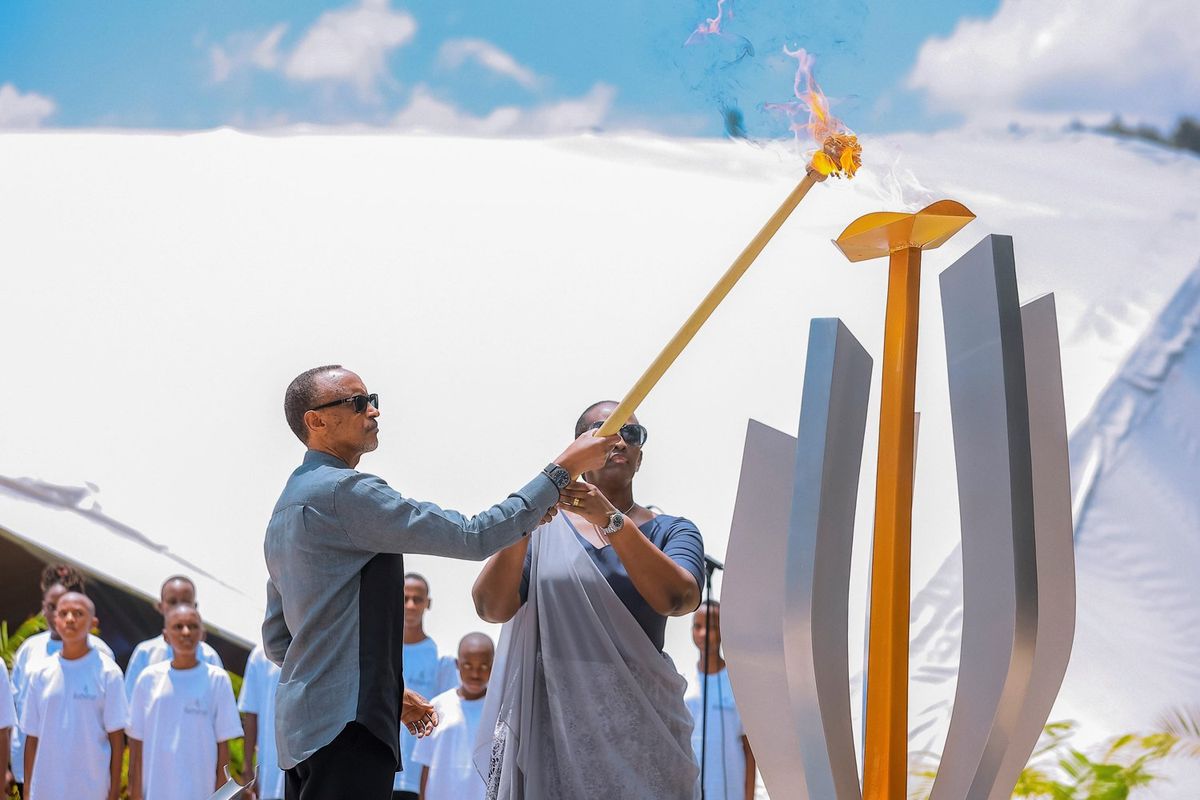Rwanda Will Commemorate 30 Years Since 1994 Genocide With Week of Remembrance
For one week, flags will fly at half mast, sport events and movies not connected to the genocide will be prohibited from terrestrial TV, and music will not be played in public.

Rwandan President Paul Kagame and first lady Jeannette Kagame light the flame of remembrance during the commemoration of the 29th anniversary of the 1994 genocide against Tutsis at the Kigali Genocide Memorial in Kigali, Rwanda, April 7, 2023.
From Sunday, April 7, Rwandans will commemorate 30 years since the 1994 genocide. The annual remembrance event will continue the tradition of somber yearly memorials. President Paul Kagame will begin the week with the usual visit to the Kigali Genocide Memorial grounds, believed to be where about 250,000 people were mass buried.
Tagged “Kwibuka (Remembrance) 30,” Kagame will be joined by top government officials and international dignitaries at the Kigali Genocide Memorial, where he will deliver a speech, lay a large wreath in memory of the dead, and light the Flame of Remembrance. The flame will be on for 100 days, signifying the length of time that the genocide lasted.
For the next week starting on Sunday, a period of national mourning will be observed. In those seven days, national flags will fly at half mast, sports events and movies not connected to the genocide remembrance will be prohibited on terrestrial TV broadcasts, music will not be played in public, and the general public is expected to conduct itself in a solemn manner. Across the country, there will be candlelight processions, as well as other memorial gatherings.
Organized in collaboration with the Permanent Delegation of Rwanda to UNESCO, the United Nations will also be hosting a commemoration event at the UNESCO Headquarters in Paris, France, on Sunday. In 2003, the UN General Assembly declared April 7 as the International Day of Reflection on the 1994 genocide.
Widely referred to as the last mass genocide of the 20th century, ethnically charged killings saw Hutu extremists murdering an estimated 800,000 Tutsis and Hutu moderates who were against the violence. While Rwanda has rebuilt in the years since, the effects of the genocide are still felt in the country. Mass graves are still being unearthed nearly 30 years later.
About two-thirds of the people currently in Rwanda were born after the genocide, but the violent occurrence is taught in schools as part of a controlled curriculum. This means all Rwandans are informed about the genocide, ensuring that the significance of the observance isn’t lost on anyone.
- France Offers Tepid 'Apology' to Rwanda During Kigali Genocide Memorial Speech ›
- This Official is on Trial for His Alleged Role in the Rwandan Genocide ›
- Former Politician Ladislas Ntaganzwa Convicted for Role in Rwandan Genocide ›
- Young Rwandans are Leading Commemorations of the 30th Anniversary of the 1994 Genocide Against the Tutsi - Okayplayer ›
- Four Standout Quotes from Paul Kagame’s Session at Global Citizen NOW - Okayplayer ›
- Rwanda’s Election Campaigning is Underway, as President Seeks Another Term - Okayplayer ›
- Young Rwandans Are Largely Hopeful for Their Future Ahead of Elections - Okayplayer ›
- Former Guinea Strongman Wants to Appeal Conviction for Brutal Massacre - Okayplayer ›
- Guinea Starts Three Days of Mourning for Victims of Stampede During Football Match - Okayplayer ›

